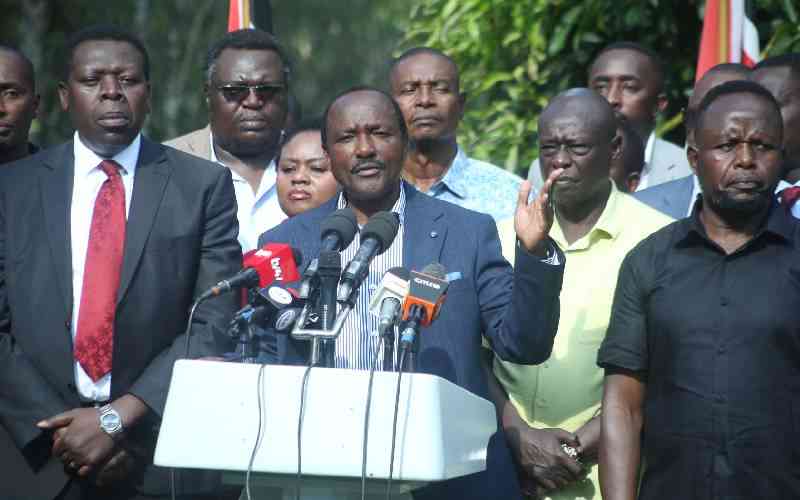United opposition leaders led by Kalonzo Musyoka address a press briefing in Nairobi, on November 3, 2025. [Collins Oduor, Standard]
Every nation that has become a yardstick for development and growth will always possess a few defining characteristics. Chief among them is a leader who chose to do things differently, one willing to sacrifice personal comfort, disrupt normal course of affairs, and even create powerful enemies in the process.
Singapore, the island nation that defied geographic and political odds, had Lee Kuan Yew. Lee meticulously identified five fundamental components of successful nation-building: stability, education, attracting investment, improving living standards, and ensuring national security. In each of these areas, his government engineered great, often painful, progress.
In just three decades, Lee defined the country and put it on a path toward what it is today: one of the world’s most powerful economies. But this path was not without heavy sacrifices and intense political friction. In education, he ruthlessly emphasized Science and Technology, priming Singaporeans to be the country’s greatest resource.
Follow The Standard
channel
on WhatsApp
Their knowledge and ingenuity became the foundation of the nation’s revolutionary economic developments. His policies were often authoritarian and drew international criticism, yet they laid an undeniable groundwork of discipline and prosperity.
This pattern of transformative sacrifice is universal. Nelson Mandela sacrificed 27 years of his life to bury apartheid in South Africa, a struggle that cost lives of thousands of patriots. While the nation still wrestles with complex challenges, it remains among top economies in Africa, a beacon of democratic transition. The man who gave birth to Modern Turkey is Kemal Ataturk.
He radically modernised the country’s legal and educational systems and encouraged adoption of a European way of life, culminating in the writing of Turkish in the Latin alphabet and the mandated adoption of European-style family names.
Without downplaying the combined efforts of all Kenyan leaders since independence, I dare say we are yet to get that defining, disruptive man or woman, and the path to finding them seems to get harder by the day. If there was a time such a person could have easily ascended, it was at independence. That era produced Kenya’s share of faithful patriots ready to lay down their lives for the nation’s ideals.
Today, however, our politics is no longer driven by national ideals but operates as business, demanding massive financial outlay to compete. The good leaders among us, those driven by vision and a moral compass, often do not have the resources to mount campaigns that can propel them to leadership. They are inevitably drowned out by the noise of well-funded populists who prioritise short-term gain and patronage networks over long-term, painful, but necessary national transformation. The cycle is self-perpetuating: wealth buys power, and power protects wealth, leaving little room for the radical sacrifices required to truly lift a nation.
As I take a short break from this labour of love and sweat, my prayer is one day we shall have a nation truly governed by ideals rather than by deals. Bye, for now.
[email protected]
Follow The Standard
channel
on WhatsApp
By Mike Nyagwoka


